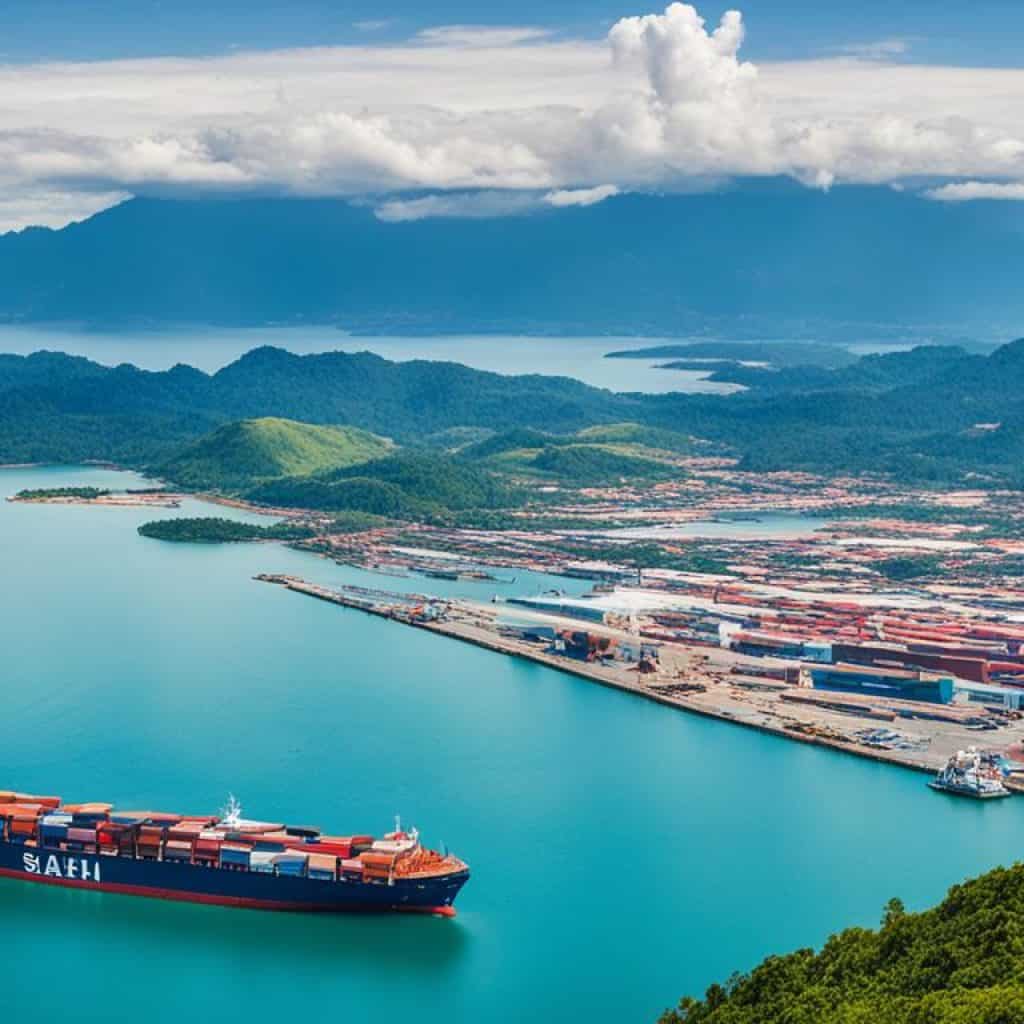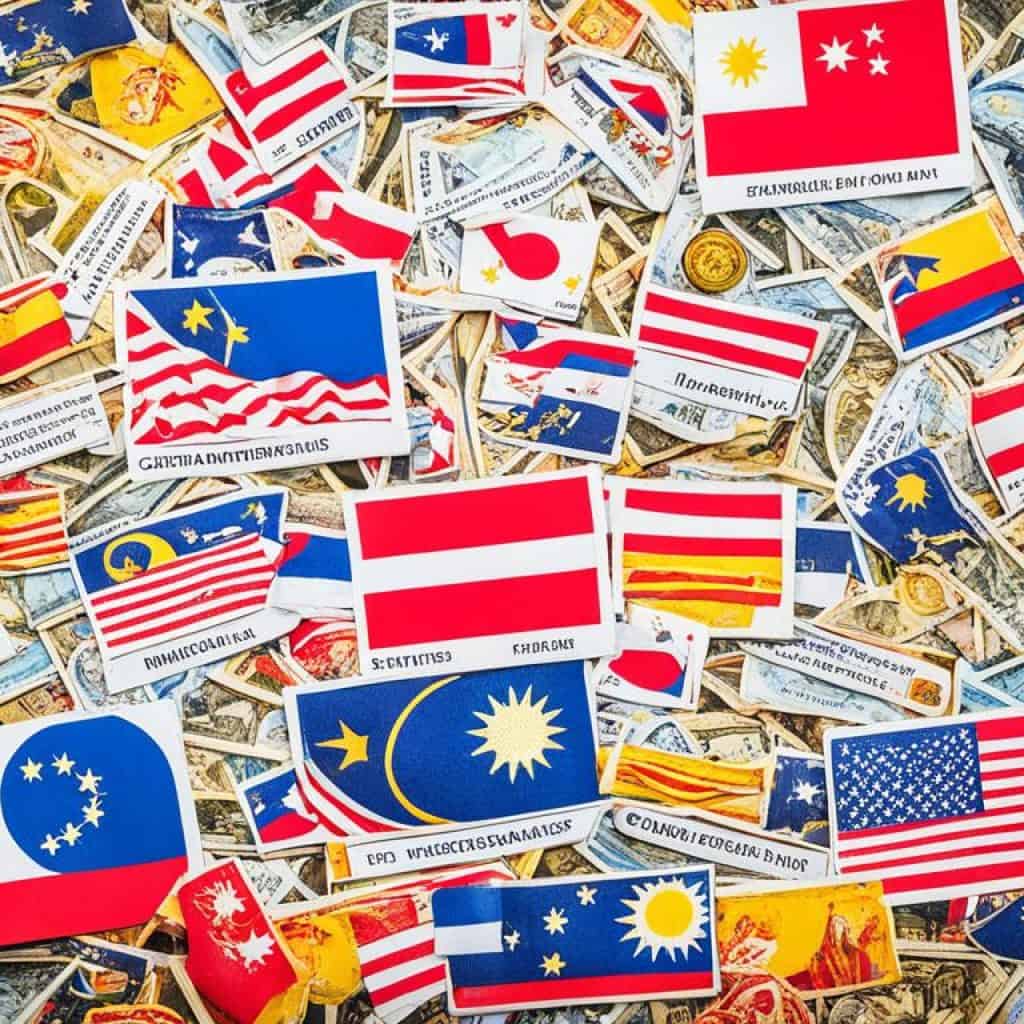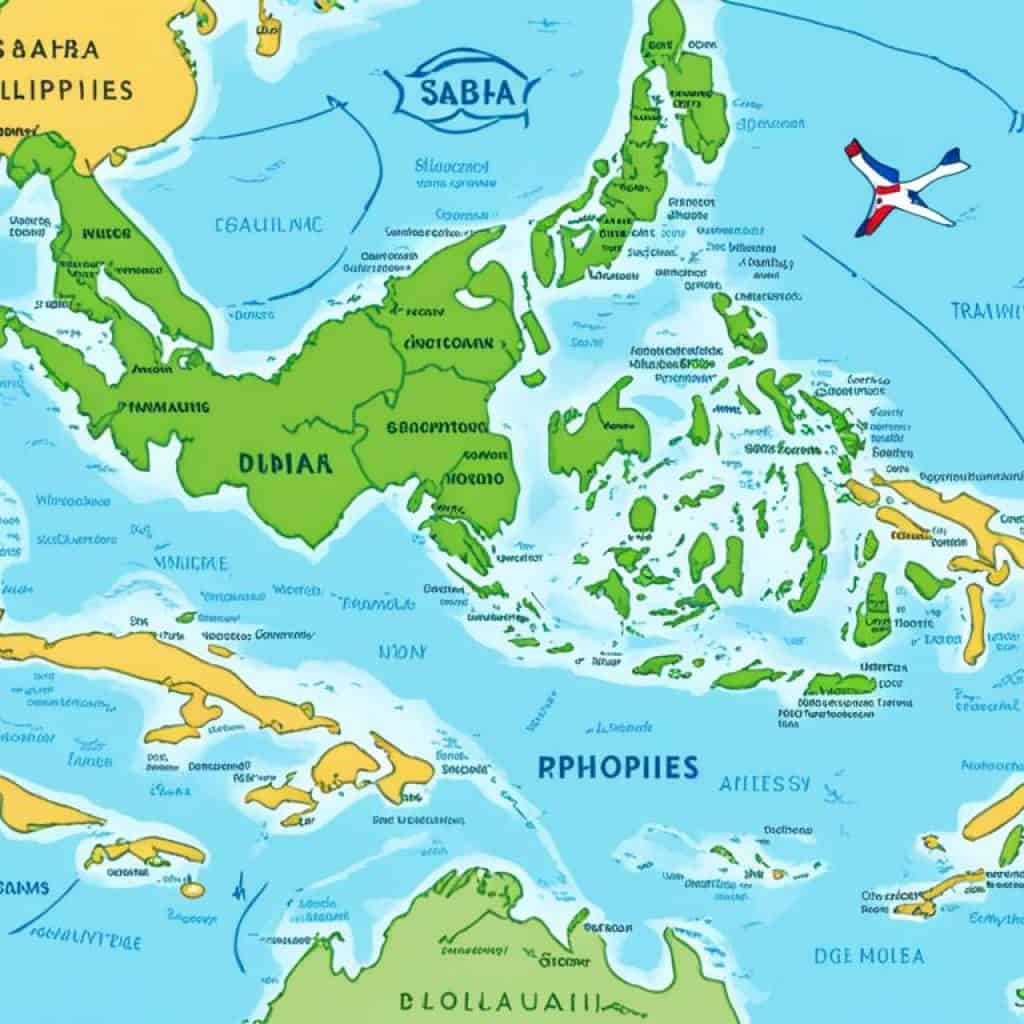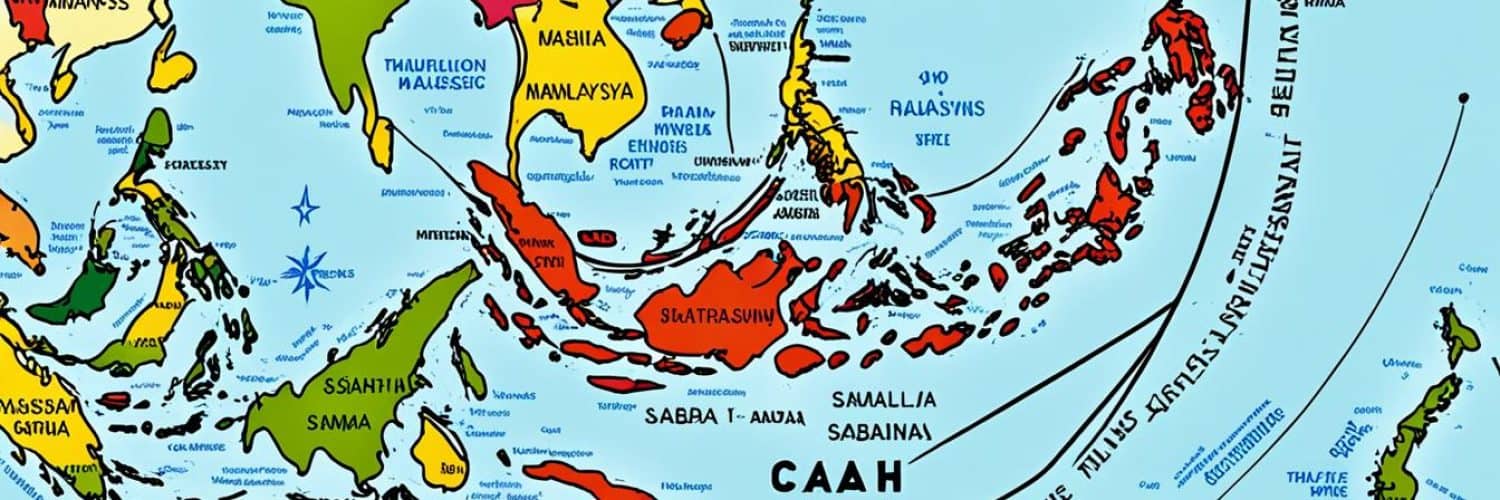Is Sabah, a state located on the island of Borneo, really part of the Philippines? The longstanding dispute between Malaysia and the Philippines over the ownership of Sabah has captured international attention and raised questions about the historical and geopolitical connections between these two Southeast Asian nations. In this article, we will delve into the complex history, territorial claims, recent escalations, and diplomatic spats surrounding the Sabah dispute. Join us as we explore the facts and examine the prospects for resolution in this contentious issue.
- The dispute over Sabah’s ownership dates back to the 1800s when the Sultanate of Sulu ruled over the region, which encompassed parts of Borneo, including Sabah.
- Recent events, such as Malaysia’s submission to the United Nations and the exchange of heated words between the top diplomats of both countries, have intensified the Sabah dispute.
- The Sabah dispute has raised questions about ASEAN’s role in resolving intra-ASEAN disputes and the geopolitical motivations behind the issue.
- Sabah’s strategic location, natural resources, and security challenges contribute to its significance for both Malaysia and the Philippines.
- The prospects for resolution in the Sabah dispute remain uncertain, but continued dialogue and diplomatic negotiations offer hope for a peaceful resolution.
A Long-standing Dispute
The Sabah territorial dispute is a deeply rooted issue that dates back to the 1800s. At that time, the Sultanate of Sulu held control over the region, including the area now known as Sabah. In 1878, a contract was signed between the Sultanate and the British North Borneo Company, granting the company the right to govern the eastern half of North Borneo.
Following the Second World War, North Borneo was transferred to the British government and eventually became part of Malaysia in 1963. However, the Philippines has maintained its claim over Sabah, arguing that the 1878 contract was a lease rather than a sale of land. This historical background sets the stage for the ongoing territorial dispute.
Recent Escalation
The Sabah dispute between Malaysia and the Philippines has recently witnessed an escalation, with both countries taking their arguments to the United Nations. The dispute centers around Malaysia’s submission to the United Nations in late 2019, in which they sought to extend their continental shelf beyond the standard 200 nautical miles off the northernmost point of Malaysian Borneo. Malaysia’s move was seen as a precautionary measure against Chinese expansionism in the South China Sea.
In response, the Philippines issued a note verbale to the United Nations, asserting that Malaysia’s claim encroached on parts of North Borneo, known as Sabah, over which the Philippines has never relinquished sovereignty. This exchange of letters between the two countries has only served to intensify the dispute and further complicate the already tangled web of competing claims and historical ties.
United Nations Dispute
“The recent escalation of the Sabah dispute has brought it into the realm of international diplomacy, with both Malaysia and the Philippines lobbying their cases at the United Nations. This not only highlights the importance of the issue, but also the parties’ willingness to bring their claims to a global stage.”
This recent development underscores the contentious nature of the Sabah dispute and the lengths to which both countries are willing to go in order to defend their respective positions. As tensions continue to rise, finding a resolution to this long-standing disagreement becomes increasingly challenging.
Geopolitical Motivations
Some analysts suggest that both Malaysia and the Philippines are using the Sabah issue as a diversion from growing domestic problems arising from the COVID-19 pandemic. The rhetoric surrounding the Sabah dispute allows politicians to set their political agenda and cater to specific voter bases, particularly in the southern region of Mindanao, which is geographically close to Sabah. However, both countries are careful not to let the Sabah issue affect ASEAN solidarity, as they are both founding members of the Association of Southeast Asian Nations.
While the COVID-19 pandemic continues to impact various aspects of society, including the economy and public health, the Sabah dispute serves as a distraction from these pressing issues. Politicians can leverage the dispute to redirect public attention and focus on matters related to territorial claims, which may spark nationalistic sentiments and appeal to specific voter groups.
“The Sabah issue provides a convenient diversionary tactic for politicians to rally support and maintain their political standing amidst the challenges brought about by the pandemic. By emphasizing the dispute, they can shift the focus away from pressing domestic concerns.” – Political Analyst
Both Malaysia and the Philippines, being ASEAN members, are aware of the importance of maintaining unity and solidarity within the regional bloc. They strive to prevent the Sabah dispute from undermining the cohesive framework of ASEAN, which promotes mutual cooperation and collective decision-making on regional issues.
The ASEAN community is built upon the principles of mutual respect, peaceful coexistence, and dialogue. As founding members of ASEAN, both Malaysia and the Philippines understand the significance of preserving regional harmony, stability, and cooperation. They are careful not to let the Sabah dispute escalate to a level that could harm ASEAN’s credibility and hinder its ability to address broader regional challenges.
Historical Context
The historical context surrounding the Sabah dispute sheds light on the complex ties between the Sultanate of Sulu, Sabah’s incorporation into Malaysia, and the ongoing payment of token rent to the Sulu Sultanate.
The Sultanate of Sulu, a historical ruling entity, had dominion over the Sulu Archipelago, parts of Mindanao, and parts of Borneo, which includes Sabah. However, in 1963, Sabah became incorporated into Malaysia, leading to the current dispute.
Despite Sabah’s incorporation into Malaysia, the Sulu Sultanate continues to receive token rent from Malaysia for Sabah on an annual basis. This financial arrangement further adds to the complexities of the historical ties between the Philippines and Sabah, fueling the ongoing dispute.
Failed Retake Attempt
In 2013, around 200 members of the Royal Sulu Army, claiming to be followers of the rightful heir of the Sultan of Sulu, sailed to Sabah in a failed bid to retake the territory. Gun battles between the group and Malaysian authorities ensued, lasting for weeks and resulting in casualties on both sides. This failed retake attempt further heightened tensions between the Philippines and Malaysia over the Sabah dispute.
Recent Diplomatic Spats
Diplomatic tensions over the Sabah issue have recently flared up, resulting in an exchange of heated words between the top diplomats of Malaysia and the Philippines. The Philippine Secretary of Foreign Affairs, Teodoro Locsin Jr., made a bold statement declaring that Sabah is not part of Malaysia. This assertion drew immediate criticism from Malaysia’s Foreign Minister, who vehemently defended their country’s sovereignty over Sabah.
Another point of contention in the recent diplomatic spats relates to the Philippine proposal to include Sabah in its passport maps. This move sparked a significant reaction from Malaysia, with concerns raised about the potential implications and the ultimate goal behind such a proposal. The Philippine proposal has added fuel to the already inflamed Sabah issue, further straining the relationship between the two countries.
Sabah issue rhetoric has intensified, with the exchange of heated words between the diplomats of Malaysia and the Philippines. The proposal to include Sabah in the Philippine passports has only served to worsen the situation, deepening the divide.
ASEAN’s Role
The ongoing Sabah dispute has presented a test for ASEAN in its commitment to promoting regional cooperation and resolving intra-ASEAN disputes through dialogue. However, progress in addressing the Sabah issue has been slow, revealing the difficulties in reaching a unanimous consensus among member states. While ASEAN has played a role in mitigating tensions between Malaysia and the Philippines, the resolution of the Sabah dispute has not been a prominent agenda item in ASEAN meetings. This presents a challenge for ASEAN in ensuring that this dispute does not destabilize the region.
Sabah dispute as a test for ASEAN: The Sabah dispute has become a litmus test for ASEAN’s ability to effectively handle and resolve internal conflicts among its member states. The organization’s commitment to maintaining regional stability and promoting dialogue is being put to the test in finding a peaceful solution to the Sabah dispute.
Lack of progress in resolving intra-ASEAN disputes: The lack of progress in addressing the Sabah dispute highlights the complexities and challenges involved in reaching a resolution for intra-ASEAN conflicts. It underscores the difficulties in achieving unanimity among member states, as each country has its own interests and perspectives on the matter.
Resolving intra-ASEAN disputes: ASEAN’s primary objective is to foster closer regional integration and resolve conflicts through dialogue. The Sabah dispute serves as an opportunity for ASEAN to further refine its mechanisms for mediating and resolving disputes among member states, ensuring peaceful coexistence and cooperation within the region.
Although ASEAN has made efforts to facilitate dialogue between Malaysia and the Philippines regarding the Sabah issue, the complexities and sensitivities surrounding the dispute have hindered significant progress. Nevertheless, ASEAN must continue its commitment to the principles of non-interference and dialogue, serving as a platform for open discussions and peaceful negotiations.
Geostrategic Importance of Sabah
Sabah’s strategic location and abundant natural resources make it a region of great importance to both Malaysia and the Philippines. Situated along a 1,000-mile shoreline, Sabah is washed by three bodies of water: the South China Sea, the Sulu Sea, and the Celebes Sea. This strategic location provides access to vital sea lanes and trade routes, making Sabah a valuable gateway to Southeast Asia.
Furthermore, Sabah possesses significant natural resources that contribute to its geopolitical significance. The region boasts substantial oil and gas reserves, ensuring energy stability for both Malaysia and the Philippines. In addition, Sabah has commercially exploitable timber, enriching the forestry industry in the area.
| Strategic Factors | Implications |
|---|---|
| Strategic Location | Sabah’s location along important sea routes enhances trade and economic connectivity. |
| Natural Resources | The abundance of oil, gas, and timber in Sabah contributes to economic growth and energy security. |
| Security Challenges | Maintaining security and stability in Sabah is vital due to the presence of militant groups like Abu Sayyaf. |
Sabah’s security challenges also contribute to its significance. The region faces threats from Philippine-based militant groups, such as Abu Sayyaf, which have carried out acts of terrorism and piracy in the area. Ensuring the security and stability of Sabah is crucial for both Malaysia and the Philippines to safeguard their interests and protect the safety of the region’s inhabitants.

The image above highlights the strategic location of Sabah and its proximity to important bodies of water, emphasizing its immense geopolitical value.
Internal Dimensions in Sabah
Discontentment within Sabah arises from a perceived loss of autonomy and increased control by the Malaysian federal government. The 1976 amendment to the Malaysia Agreement 1963 modified Sabah’s status as an equal partner, resulting in grievances among certain quarters in Sabah. Despite its significant economic contributions, Sabah lags behind other states in Malaysia in terms of development. This sense of exploitation and lack of support has fueled discontent against the federation.
| Challenges in Sabah | Impact |
|---|---|
| Perceived loss of autonomy | Heightened discontent among locals |
| Increase in government control | Reduced decision-making power for Sabah |
| Economic underdevelopment | Frustration over lack of progress and opportunities |
“Sabah’s discontentment is rooted in the belief that the federal government exerts excessive control over the state, limiting its ability to address local needs and priorities. The perceived economic underdevelopment further exacerbates this discontent.”
Cultural and Historical Connections
Malaysia and the Philippines share deep-seated cultural and historical ties that have spanned centuries. These connections have shaped the relationship between the two countries and continue to play a significant role in their interactions.
Before the era of colonial rule, Malaysia and the Philippines witnessed intermarriages between their ruling families, fostering a sense of shared heritage. These marriages served as a testament to the cultural exchange and deep connections between the two nations.
Furthermore, there were significant population exchanges between Malaysians and Filipinos of Malay-Polynesian descent. These exchanges further solidified the bonds between the two countries and contributed to the preservation of their shared cultural traditions.
Notably, both Malaysia and the Philippines are home to large Chinese minorities, which have further facilitated cross-border relations. The Chinese communities in both countries have played influential roles in trade, commerce, and cultural exchange, fostering closer ties between Malaysia and the Philippines.
Overall, these cultural and historical connections have not only shaped the relationship between Malaysia and the Philippines but have also fostered a sense of shared heritage and understanding between the two nations.
Quotes
“The intermarriages and population exchanges between Malaysia and the Philippines have created a strong bond that goes beyond borders. These connections are a testament to our shared heritage and cultural traditions.” – Dr. Ahmad, Cultural Historian
Tables
| Shared Cultural Traditions | Intermarriages | Population Exchanges |
|---|---|---|
| Malay-Polynesian heritage | Ruling families | Malaysians and Filipinos |
| Chinese influence | Trade and commerce | Cross-border communities |
Economic Relations
Trade between Malaysia and the Philippines plays a significant role in their economic relations. In 2002, the Philippines ranked as the 16th largest export market and the 9th largest import market for Malaysia. On the other hand, Malaysia was the 7th largest export market and 8th largest import market for the Philippines. This bilateral trade reflects a strong economic partnership between the two countries, with mutual benefits and opportunities for growth.
Furthermore, Malaysia is one of the main sources of foreign investments for the Philippines among ASEAN countries. The Malaysian government has actively encouraged its businesses to invest in the Philippines, fostering economic cooperation and contributing to the growth of both nations. These investments have helped create jobs, promote innovation, and strengthen the economic ties between Malaysia and the Philippines.
To enhance economic cooperation and facilitate trade between the two countries, the Malaysia-Philippines Business Council has been established. This council serves as a platform for business leaders and stakeholders from Malaysia and the Philippines to engage in dialogue, identify common interests, and explore opportunities for collaboration. Through the Malaysia-Philippines Business Council, efforts are made to streamline trade processes, address regulatory challenges, and promote investment-friendly policies.
Key Points:
- Trade between Malaysia and the Philippines is mutually beneficial.
- The Philippines is an important market for Malaysian exports, while Malaysia is a significant market for Philippine exports.
- Malaysia is a key source of foreign investments for the Philippines among ASEAN countries.
- The Malaysia-Philippines Business Council promotes economic cooperation and trade between the two countries.
Quote:
“Trade between Malaysia and the Philippines serves as an engine for economic growth, creating opportunities and fostering closer ties between our nations.” – Business leader from Malaysia

Marine Conservation and Security Collaboration
Malaysia and the Philippines have joined forces to implement joint conservation measures in the Sulu Sea, emphasizing the importance of protecting the marine environment while addressing security challenges. This collaboration is vital in safeguarding the Sulu Sea from piracy and the presence of extremist militant groups based in the southern Philippines.
Working alongside Indonesia, Malaysia and the Philippines strive to secure the Sulu Sea and maintain stability in the region. By combining their efforts and resources, the three countries aim to combat illegal activities, promote sustainable fishing practices, and preserve the rich biodiversity of the area.
The joint conservation measures not only ensure the preservation of the marine ecosystem but also contribute to enhancing regional security. By curbing piracy and countering extremism, this collaboration helps promote peace and stability, which are paramount for the prosperity and well-being of the nations in the region.
Assistance and Aid
In times of need, Malaysia has shown its unwavering commitment to the Philippines by providing valuable assistance and aid. This support extends to various humanitarian relief efforts and peace facilitation initiatives.
During the devastating Bohol earthquake in 2013 and the catastrophic Typhoon Haiyan that took place in the same year, Malaysia quickly mobilized its resources. Recognizing the urgent need for assistance, Malaysia donated funds and sent relief items to the affected areas in the Philippines. This humanitarian relief effort demonstrated Malaysia’s solidarity and willingness to help their neighboring country in times of crisis.
Beyond humanitarian relief, Malaysia has also been actively involved in peace facilitation processes in the southern Philippines. By participating in these efforts, Malaysia aims to contribute to the establishment of peace and stability in the region. Through diplomatic negotiations and dialogue, Malaysia has played a crucial role in fostering peaceful resolutions and nurturing a climate of harmony between conflicting parties.
These initiatives undertaken by Malaysia underscore its commitment to supporting the Philippines during challenging times. Through humanitarian aid and peace facilitation, Malaysia has proven to be a steadfast partner, providing much-needed assistance that goes beyond mere rhetoric.
Prospects for Resolution
The resolution of the Sabah dispute remains uncertain. While ASEAN plays a role in addressing intra-ASEAN disputes, progress has been limited in the case of Sabah. Prospects for resolution rely on diplomatic negotiations between Malaysia and the Philippines and the willingness of both parties to find a mutually acceptable solution.
Mediation by ASEAN could also be explored as a means to facilitate dialogue and come to a resolution. The regional organization has a track record of successfully mediating in various conflicts, and its involvement could provide a neutral and impartial platform for discussions.
“We must find a peaceful solution to the Sabah dispute through comprehensive and inclusive dialogue. It is in the best interests of all parties involved to work towards a mutually beneficial resolution.”
Effective diplomatic negotiations will require open communication, compromise, and a commitment to seek common ground. Both Malaysia and the Philippines must approach the table with a genuine willingness to find a peaceful and sustainable resolution to the long-standing dispute over Sabah.
ASEAN Mediation and Diplomatic Efforts
ASEAN, as the regional bloc representing Southeast Asian countries, has the potential to play a vital role in mediating the Sabah dispute. It can provide a neutral space for discussions, promote peaceful negotiations, and support the resolution process.
By engaging ASEAN in the mediation process, Malaysia and the Philippines can benefit from the wisdom and experience of other member states who have successfully resolved their own territorial disputes. Through diplomatic negotiations and with the support and guidance of ASEAN, both parties can work towards achieving a peaceful resolution that respects the sovereignty and interests of all involved.
Ultimately, the future of the Sabah dispute depends on the commitment and cooperation of Malaysia and the Philippines, as well as the involvement of ASEAN. Through persistent dialogue, sustained diplomatic efforts, and a shared desire for peace, a resolution to the Sabah dispute can be reached, contributing to stability and prosperity in the region.

Conclusion
The Sabah dispute between Malaysia and the Philippines is a complex issue that encompasses historical, geopolitical, and economic factors. It has been a contentious topic for decades, and recent events have brought it back into the spotlight. However, finding a resolution to this longstanding disagreement is no easy task.
Both Malaysia and the Philippines have conflicting claims and deep-rooted historical ties to Sabah, which contribute to the complexity of the dispute. Despite the challenges, continued dialogue and diplomatic negotiations hold promise for a peaceful resolution. The involvement of ASEAN, with its mandate for regional cooperation and conflict resolution, could play a crucial role in facilitating discussions and finding common ground.
It is important to approach the Sabah dispute with careful diplomacy and a commitment to exploring all possible avenues for resolution. The status of Sabah’s ownership is a sensitive issue, and any progress made must be achieved through respectful dialogue and understanding. By prioritizing peaceful negotiations, both Malaysia and the Philippines can work towards a resolution that respects the interests and aspirations of all parties involved.
The journey towards resolving the Sabah dispute is likely to be challenging and require significant effort and compromise. However, as history has shown, even the most complex disagreements can be resolved through dialogue and mutual understanding. With continued commitment and perseverance, there is hope for a peaceful resolution to the Sabah dispute and a step towards fostering stronger relations between Malaysia and the Philippines.


















Add comment